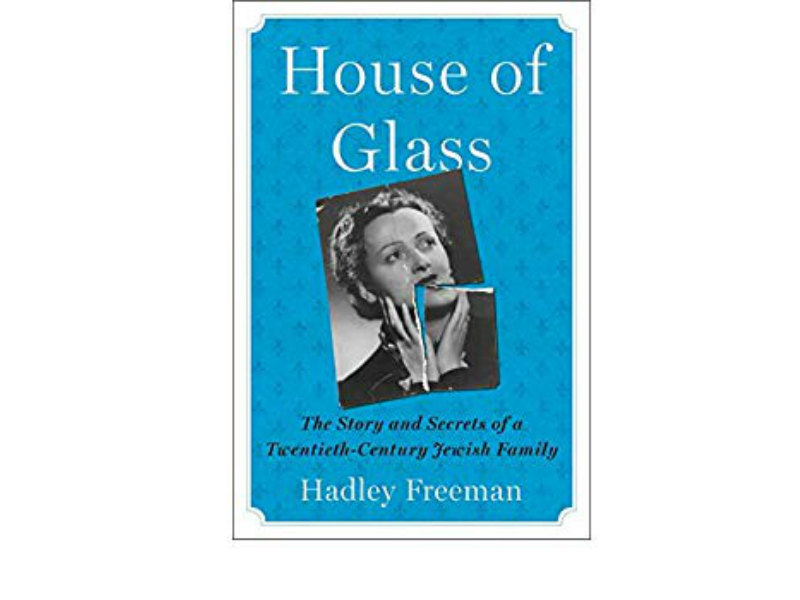Sometimes an old shoebox at the back of a darkened closet contains more than tired shoes, stained jars of dried shoe wax, brittle brushes and frayed bits of terrycloth. Sometimes, an old shoebox contains a trove of mystery keepsakes, keys that ultimately unlock a family’s undiscovered, perhaps even hidden, past, as was the case for 28-year-old Hadley Freeman, when she was rummaging through her late grandmother’s closet.
In 2006, Freeman, a successful journalist at the Guardian newspaper in London, was looking for information that might anchor a feature story about her late grandmother’s relationship to fashion. Instead, she found tantalizing bits and pieces of a puzzle that she would carefully and lovingly assemble into the story of her family. The fortuitous result is the book, House of Glass.

(Photo Credit: Linda Nylind)
Freeman begins her story in the late 19th century with the six-person Glahs family – Reuben, Chaya and their children, Jehuda, Jakob, Sender and Sala – who lived in Chrzanow, a shtetl in modern-day Poland.
Resentment, hatred, anti-Semitism and violence drove the family out of Poland and into France between the two World Wars. Glahs became Glass. Jehuda, Jakob, Sender and Sala became Henri, Jacques, Alex and Sara, respectively. They rebuilt their lives in their adopted home of France, the nation of “liberty, equality and fraternity.” But, unfortunately, they could not at the same time rebuild their new host society. Resentment, hatred, anti-Semitism and violence enveloped the Glass family in France, too.
Freeman’s grandmother, Sara Glass, left France before the Second World War for the safety of the United States. She was spared the innumerable depredations that her family suffered during the war. Indeed, the very reason for her leaving France was to try to save her family from those very misfortunes and dangers. But, much to her everlasting heartache, she was the sole member of her immediate family to ever live in America. For the rest of her life, Sara Glass pined for Paris and the life she imagined she would have lived there. A noticeable element of sorrow accompanied her throughout her days. Freeman’s attempt to understand and grasp her grandmother’s sadness was the activating impetus for the book.
In writing the personal histories of all of her grandmother’s immediate family members, Freeman necessarily writes about the social, cultural, economic and military histories of the various communities in which they lived. Her research is impressive. She meticulously recorded factual details in the manner of a well-trained journalist, ensuring the narrative stands tall against known reliable historical accounts. With a historian’s unflinching loyalty to accuracy, often relying upon unredacted records chronicling official cruelty, Freeman masterfully recreates the very dark atmosphere of the times.
READ: AUTHOR EXCAVATES HER JEWISH-ITALIAN FAMILY HISTORY
France’s Vichy government was zealous in its quest to root out Jews. As Freeman frequently notes, Vichy officials often exceeded Nazi orders and expectations. In October 1940, the Vichy government passed a law ordering the internment of all foreign Jews in “special camps,” which included the Glass family. More than 40,000 Jews were interned.
The dreadful internment law was enacted during horrendous times. But not all French citizens were horrified. Freeman reproduces an excerpt from a column written in L’Echo de Pithiviers, a newspaper in the small city of Pithiviers, where one of the detention camps was located. The author, Jean di Nebelle, celebrated the fact that Jews would now be “behind barbed wire, rather than at the head of our city halls and our great places, as they were previously under the regime of Blume, of Zay, of the Levys and the flea-ridden Semites they brought with them.…Today the rule of the Jews is over. France finally is protecting herself from them. Thus, the wheel turns! And the Jews, yesterday, all powerful, are today merely miserable animals of concentration camps. After having betrayed and ruined us, here they are reduced themselves, impotent and almost deserving of pity!”
By the end of House of Glass, the reader is deeply familiar with each member of the Glass family. This is, of course, entirely due to Freeman’s skill as a writer. She provides dimension, character and emotion to the individuals whom we meet and come to know throughout the book. Freeman is also to be commended for the delicate literary touch and neat turns of phrase that she employs to depict situations of high or low drama. For example, she writes of her great-uncle Henri and his wife, Sonia, that they “almost never spoke about what they had been through, but they were marked by the experience like a block of clay is by a firm fingerprint.”
Freeman never emotionally exploits the many difficult and heartbreaking situations in which the Glass siblings find themselves. She simply writes the truth as she imagined it, or as it was related to her many years later. For example, her great-uncle Alex was able to smuggle his mother, Chaya, out of Paris at a particularly dangerous point in the Nazis’ occupation of the city. Freeman writes: “Alex achieved an enormous amount in his life, escaping the depths of the Polish pogroms, to climb to the top of the French art world, all thanks to his cunning and determination. But that he managed to sneak his truculent, strictly kosher, non-French speaking mother across the demarcation line was possibly his most extraordinary feat.”
Freeman also tries to convey deeper understandings of the historical context by drawing contemporary parallels to issues and politics that dominate and roil public discourse in our own times. But the story does go a bit off the rails when she speculates for nearly an entire chapter about Jewish social mobility, or when she interweaves her own political views and her own understanding of Judaism and Jewish ritual into the story. These opinions detract from the otherwise comprehensive sense of personal and national history that House of Glass so admirably conveys.
